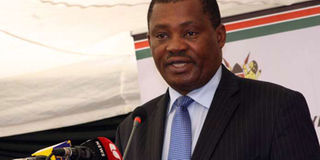MPs shoot down Bill to alter election date

Speaker of the National Assembly Justine Muturi speaking during the launch of the Centre for Parliamentary Studies and Training (CPST) in Karen, on September 22, 2015. Muturi said the Constitution Amendment Bill ,which led to the first amendment of the Constitution, voted for by Kenyans in 2010, would be forwarded to the Senate for consideration. PHOTO | ROBERT NGUGI | NATION MEDIA GROUP
What you need to know:
- Despite the lawmakers having passed a Constitution Amendment Bill to transfer the Equalisation Fund from counties to constituencies, with the required two thirds majority, the numbers fell moments later, resulting in the defeat of the draft law on the election date.
- The fund, created by the Constitution, is meant to benefit marginalised counties. The Bill to transfer the fund was sponsored by Samburu West MP Lati Lelelit.
Kenyans will vote in August during the 2017 General Election, as stipulated in the Constitution, after MPs rejected a Bill that would have changed the date to December.
Despite the lawmakers having passed a Constitution Amendment Bill to transfer the Equalisation Fund from constituencies to counties, with the required two thirds majority, the numbers fell moments later, resulting in the defeat of the draft law on the election date.
MPs from marginalised regions celebrated as billions of shillings from the Equalisation Fund will now be handled by them, and not governors.
They will have a say on which projects to be given priority. The fund, created by the Constitution, is meant to benefit marginalised counties. The Bill to transfer the fund was sponsored by Samburu West MP Lati Lelelit.
Some 246 MPs voted for it, and only two opposed it.
BILL REBUFFED
National Assembly Speaker Justin Muturi said the Bill, which led to the first amendment of the Constitution, voted for by Kenyans in 2010, would be forwarded to the Senate for consideration.
The Bill to change the election date, sponsored by Ugenya MP David Ochieng, suffered a blow after it failed to meet the required two thirds majority.
It secured 216 votes, 17 short of the required majority. Twenty-four MPs voted against it and four abstained.
If this draft law had sailed through, it would have had far-reaching implications on Kenyans, meaning that they would be required to vote at a time when they were preparing for Christmas festivities.
The Constitution stipulates that the election date should be the second Tuesday of August.
Drafters of the supreme law sought to bring certainty over the poll date. This was aimed at ensuring that leaders do not arbitrarily change the date to suit their interests.
Mr Ochieng said his attempt to change the election date to the third Monday of December was aimed at protecting the budget-making cycle and the national examinations calendar from undue interruption should the polls be held in August.
He, however, failed to win over the MPs, who could also have seen their current terms extended by four months, had they chosen to vote in favour of the Bill.





